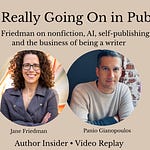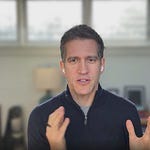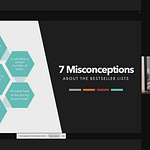Jacob Weisberg belongs on the Mount Rushmore of podcast executives. As the editor in chief of Slate, he greenlit the publication’s first podcast, Slate Political Gabfest, all the way back in 2005 — two years before the iPhone came out. A decade later, he cajoled his friend Malcolm Gladwell into starting a show, the perennially popular Revisionist History. In 2018, they founded Pushkin Industries together, the podcast network behind hits like The Happiness Lab and Against the Rules with Michael Lewis.
“There’s this golden period with any new medium before the rules are all set,” he told me. “After a certain amount of time, people will tell you, ‘Podcasts work this way. Here’s how long they have to be. Here’s how they’re structured. Here’s what you can do and can’t do.’ But with every new medium,” he says, “there’s this period of invention,” a brief, beautiful window of time where you can, as Jacob puts it, “figure out what something should be like. When those opportunities come along, and I think they don’t come along very often, I always have an instinct to grab them.”
Before speaking with Jacob, I was pretty much convinced that the golden period had come and gone. Anyone who has followed the podcast industry has seen nine-figure deals give way to a spate of cancellations. (Four years after paying $230 million to acquire Gimlet, Spotify shuttered the once-celebrated podcast studio.) Formats like the highly produced miniseries (think Serial) are now tough sells. Launching a show that attracts a big audience is harder than ever. Unless, of course, you’re a B-list actor with a built-in following.
Jacob is no Pollyanna about this. The past few years, he admits, were “very tough at Pushkin. We had to lay off a lot of people and cancel shows that we loved that weren’t profitable. We became more risk-averse, launching fewer shows and trying to find ways not to take as much financial risk on new shows.”
But I came away from our conversation inspired by his undimmed faith in the medium.
“I think we’re through the worst,” he said. “High-quality podcasting is entirely viable. People confuse the pullback from investment with anything fundamental to the business.”
Listenership continues to grow. According to the 2025 Infinite Dial, the long-running survey of media consumption trends, more than half of Americans (12+) now consume podcasts monthly. That number has never been so high. The ad market has rebounded as well. Last year, podcast ad revenue in the U.S. exceeded $2 billion for the first time. Globally, podcasting is now a $7.3 billion industry.
And there are innovations on the horizon that give Jacob hope. He’s excited about new formats like monologues and audio essays, bullish on new funding mechanisms like paid subscriptions, and hopeful that as the industry comes to value the quality of listener engagement over the quantity of downloads, new creators will be inspired to launch shows.
“There’s no reason someone shouldn’t do a podcast that’s intended for a few thousand people,” he told me. “There are a lot of podcasts like that that work incredibly well. Not every podcast should be big, and size is not the correct way to judge the success of lots of podcasts because scale is not the goal. In fact, many excellent podcasts stop working if you try to make them too big.”
In our conversation, we talked about the secret to making a hit show, how to turn a podcast into a book, why the publishing industry has failed to capitalize on audio, and much more. Check out the video above or read the version below, which has been edited for clarity and concision and to make us sound smarter and more eloquent.
—Caleb
Author Insider: Jacob, you’re many things. You’re a Rhodes Scholar. You’re a journalist who’s written for The New York Times, The New Yorker, and The New Republic. You’re the former editor of Slate. You’re also the man who, in 2015, convinced Malcolm Gladwell to start a podcast.
Jacob Weisberg: Yes, that’s true.
Take me back to those conversations.
I got involved with podcasting very early. When I was running Slate, we had this partnership with NPR to work on a midday show called Day to Day. Andy Bowers, who I’d brought in as Slate’s producer on the show, said to me one day around 2005, “There’s this new thing called podcasting. I’ve been doing one in my garage with my daughter, and Slate should really do it.”
I said, “Great, let’s do it.”
Before long, we started what’s now the Slate Political Gabfest, one of the longest-running podcasts. Podcasting wasn’t much of a business for us then, but everyone loved doing it. Everybody at Slate wanted a podcast because they saw how much fun people were having. And the audience loved it.
Eventually, Andy and I launched a company inside of Slate to make podcasts. That was about 10 years ago. My best instinct as an editor was always to call my friends and talk them into doing stuff. So I called Malcolm Gladwell, who’s an old friend of mine.1 I’d been talking to him about podcasts for a long time. He was probably bored listening to me talk about how it was going to be the future of journalism and everything else. But I talked him into it.
In 2018, you decided to leave Slate and start Pushkin Industries with Malcolm. You could have said, “Let’s just spin off Malcolm’s show, Revisionist History, and feast on the spoils.” Instead, you hired people, launched other shows, and built a network. What was your reasoning?
I’d launched this company within Slate called Panoply. Panoply was both a technology and a content company. I was supervising it, but the CEO at the time, Brendan Monaghan, wanted to go in the technology direction and get out of content. I thought that was the right decision for the business, but it was a bad decision for the shows we had started and the producers we’d hired. All this content we’d been making, including Malcolm’s show, was going to be orphaned. So I asked Malcolm, “Why don’t we start a company and take some of the Panoply shows?”
This is a hallmark of your career. You were at The New Republic in the 1990s — the heyday of that august political magazine — and then you left to work on a website. That doesn’t sound very surprising today, but in 1996, it was a risky move, much like starting a podcast network was in 2018. You like to get in on the ground floor, don’t you?
There’s this golden period with any new medium before the rules are all set. After a certain amount of time, people will tell you, “Podcasts work this way. Here’s how long they have to be. Here’s how they’re structured. Here’s what you can do and can’t do.” But with every new medium — and you can go back to news on the radio, TV news, news magazines — there’s this period of invention where you can not only practice journalism, which is my great love, but also figure out what something should be like. When those opportunities come along, and I think they don’t come along very often, I always have an instinct to grab them.
What editorial tone did you develop at Pushkin?
Our shows tend to be authorial. Most of our hosts are writers, and it’s about their voices, their interests, and what happens when they take a writing voice and turn it into a speaking voice. It’s been a fascinating thing to watch with Tim Harford — who does his show, Cautionary Tales, for us — and with Malcolm, Michael Lewis, Jill Lepore, Dana Goodyear.
Interesting journalists rise to that challenge. They inevitably go through this cycle where they start out saying, “This is much harder than you’ve told me it was going to be.” Then: “It’s still hard, but I’m really loving it.” The final stage is: “I love it so much. It’s the only kind of journalism I want to do. I don’t really want to write for magazines or write books because the way I’m able to communicate with an audience in audio is so exciting.”
What is it about the medium that journalists like Malcolm and Michael find so bewitching?
I think it starts and ends with the power of the voice — and the disembodied voice, in particular, which is why I have some ambivalence about all of the pressure to do video podcasts. The thing about the voice is it’s in your head while you’re going about your day. Most people listen to podcasts during found time, because they’re multitasking. They’re exercising, or cleaning, or taking a walk. They’re doing something that’s hands busy, mind free. It’s a total cliché, but that breeds a certain kind of intimacy.
The other thing that proved really important was the opt-in nature of podcasts. It creates tremendous goodwill. There’s no passive consumption of podcasts. You choose to listen to a podcast. In a media environment that has grown much more toxic and negative, there’s tremendous positivity and goodwill around podcasts. You don’t hate-listen to podcasts.
What do you look for in a pitch?











